"You've heard of several kinds of cat..."
One of the most mysterious aspects of Cats is that of what actually happens in it. While it's true it doesn't have an immediately recognisable plot, there is one there, but it's tricky to find and fairly deeply buried. This particular section is my effort to fathom that plot (or, at least, storyline) and put it in context with the songs.

First of all, as most people know, Cats is based on the poems in T.S.Eliot's Old Possum's Book of Practical Cats, which were originally written in letters to his grandchildren. Nearly all of the songs, excepting Memory and Grizabella, are those poems set to music. Those that are not are selected parts from Rhapsody On A Windy Night and Preludes (as far as I can tell, anyway.) Both of these are fantastic poems, and well worth a read; hence, links have been provided from the previous page. So, in any case, that's where the lyrics came from. But what of that elusive plot?
(Bear in mind that I'm basing this on the playlist in the libretto [which I should know by heart and don't, alas; either that or I'm just lazy] and the visual portrayal in the video. I will doubtless update/correct it when I've seen the show again on March 15th.) So. Firstly, we have the Prologue: Jellicle Songs for Jellicle Cats, where each of the Jellicles in question are first introduced, more or less, although many of them have different 'identities' later in the show. Quaxo, for example, becomes Mr. Mistoffelees in Act Two, but I'm getting way ahead of myself. Important Question Number One - what's a Jellicle Cat? Well, that's explained later, but the premise is that, according to Eliot, all cats are Jellicle cats, and all dogs are Pollicle Dogs. At this point, I'm willing to say, just go with it, because later it's revealed that a Pollicle is a type of dog... but the dogs aren't important. This show's about cats, and dogs are just there to prove that they are there... In the song, however, the Jellicles introduce all their various skills, ranging from clich�s ("Are you blind when you're born?", "Dare you look at a king?", "When you fall on your head, do you land on your feet?", and so on) to more interesting attributes ("an alumnus of heaven and hell", "sing at the same time, in more than one key", and so on.) So it's safe to say that Jellicle cats are no ordinary cats. Anyone who hasn't heard of a Jellicle cat comes as rather a surprise: "Do I actually see, with my own very eyes, a man who's not heard of a Jellicle cat?"
With this brief introduction in mind, the Jellicles assemble and introduce themselves in The Naming of Cats, explaining that "a cat must have three different names" - that given by their family, a second name that is "peculiar, and more dignified", and a third, "that the cat himself knows, and will never confess." In simple terms, the loving Tom you might have called 'Fluffy' is going to be called something far more interesting when out in the alley with his mates. Still with me? Good. On we go.
Next, Munkustrap, one of the elder Toms (and, as far as I can tell, the 'second-in-command' in the heirarchy, keeping control over the younger cats and the kittens) explains why they are all gathered. Tonight is the night of the Jellicle Ball, and every Jellicle is invited. The Invitation to the Jellicle Ball is an important song in this respect, as it explains the entire premise of the musical, and, in essence, the plot. The ball takes place once a year, under the Jellicle Moon, and the leader, Old Deuteronomy, is due to appear at any time to make the important decision as to which of the cats will have the chance to ascend to the Heaviside Layer - the equivalent of heaven, or some higher plane of existence. Hence, each of the assembled Jellicles wishing to go there must perform a 'party piece' to win Deuteronomy's favour - rather like a talent show - and whoever is most worthy will be the one he chooses.
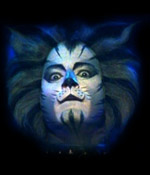
Munkustrap, acting as narrator
Here's where it all technically begins. Munkustrap continues, in a narrator capacity, to introduce the first of the candidates - the Old Gumbie Cat, Jennyanydots. The Gumbie Cat is characterised by the fact that she "sits and sits and sits and sits", and does very little else, at least during the day. At night, however, she jumps to work and keeps the household in order - educating the misbehaving mice with "music, crocheting and tatting", and creating a "beetles' tattoo" to keep the cockroaches occupied rather than idle. The rest of the Jellicles then give her three cheers, because it is her "on whom well-ordered households depend".
Next is the Rum Tum Tugger, whose reputation precedes him. He's the flirt of the Toms, sending the kittens into a frenzy, and his singular claim to fame is that he's the cat every family loves to hate - he won't eat what he's given, only what he can find for himself, and he makes a nuisance of himself. The rest of the Toms are alternately jealous or despairing of the Tugger. He can't be controlled (except, perhaps, by Deuteronomy, who is held in the greatest esteem by everyone) because "he will do as he do do."
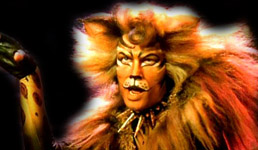
The Tugger
The tone changes all of a sudden as Grizabella, the Glamour Cat, makes her appearance. She hasn't been invited to the ball; she is the outcast of the Jellicles, once glamourous, now tattered. (In essence, to put it in simple terms, she is the Norma Desmond of the Jellicles. However, I haven't figured out who her Joe is yet ;) or any of the others, either.) She tells them all to take notice of her, before being chased off by the elder Queens.
After disposing of Grizabella, the Queens introduce Bustopher Jones (described as 'the cat about town' by Eliot originally.) He's a toff in a top hat and spats, and eats at only the finest restaurants (or rather, outside them.) Bustopher Jones is the epitome of the London cat; he knows his way about town, and is well-known everywhere. He also enjoys a game of golf.
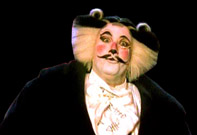
Bustopher Jones
After Bustopher's piece, there is an interlude whereby several crashes are heard, and the headlights of a car light up the alley along with the screeching of tyres. All of the Jellicles immediately assume the worst - Macavity. It is, however, not Macavity, but the other two trouble-makers of the Jellicles - Mungojerrie and Rumpleteazer. They are siblings, Cockney to the bone, and very fond of causing a ruckuss. They like to believe they're notorious criminals, although their intentions are usually good, and their crimes petty thefts - such as stealing the family's dinner - and accidental destruction, usually of expensive items. They make it very clear indeed that they always work together, and the family to whom they belong know this - "It was Mungojerrie - and Rumpleteazer - and there's nothing at all to be done about that!"
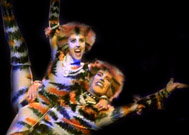
Mungojerrie and Rumpleteazer (incidentally, I've met her, although she was in Rocky Horror at the time...)
These earlier pieces, perhaps, have only been to entertain the assembled Jellicles, because Deuteronomy arrives next. Munkustrap and the Tugger introduce him, to the rapt attention of the kittens. Once Deuteronomy is settled, Munkustrap continues, and narrates the story of "The Awe-ful Battle of the Pekes and the Pollicles". Here, a 'cast' of various Jellicles play different types of dog - Pekes, Pollicles, Poms and Pugs - by dressing up in drinks cartons, old shoes, and all manner of other bizarre items found around the alley. During this shambolic and partially disastrous performance, the Great Rumpuscat is also introduced as some kind of superhero, who intervenes at the last minute and scatters the battling dogs. As Munkustrap puts it, "His eyes were like fireballs, fearfully blazing. He gave a great yawn, and his jaws were amazing."
 Old Deuteronomy, the gentle giant and revered leader of the Jellicles |
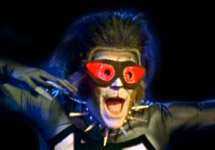 The Great Rumpuscat |
After this, Deuteronomy formally invites the Jellicles to the Ball, and Jellicles themselves are described. The festivities begin. The Jellicles all try to outdo each other until Deuteronomy intervenes and controls the Ball, and continue until the Jellicles exhaust themselves and settle down for a catnap; this is soon interrupted, however, by the re-emergence of Grizabella. She is shunned, once more, and abandoned, singing the first verse of Memory to an apparently empty alleyway - unbeknownst to her, however, Deuteronomy is listening in, with some curiosity, and he gazes on sympathetically as Grizabella drags herself into hiding again.
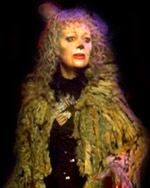
Grizabella, the Glamour Cat
So ends Act One, on a somewhat melancholy note. Act Two opens with a more reflective tone, as Deuteronomy recites The Moments of Happiness. As he says, "We had the experience, but missed the meaning, and approach to the meaning restores the experience in a different form, beyond any meaning we can assign to happiness." He seems to be teaching them something, although as yet, they have no idea what. Remember, at the end of the previous Act, Deuteronomy was the only witness to Grizabella's attempt to make herself known, so this is, perhaps, some kind of pre-emptive strike. Indeed, Grizabella's influence has already begun to show, as Jemima leads an angelic rendition of Memory along the same lines of Deuteronomy's words: "Let your memory lead you. Open up; enter in. If you find there, the meaning of what happiness is, then a new life will begin..."
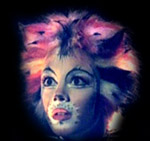
Jemima, channelling Grizabella
Next, possibly the most eligible candidate for the Heaviside Layer so far is introduced - Asparagus, or Gus, the Theatre Cat. He arrives on the arm of Jellylorum - I've yet to work out this relationship, but they're obviously close - and she explains about his various achievements in the theatre. Gus takes over, probably exaggerating, but similarly recounts his escapades, claiming that "there's nothing to equal - from what I hear tell - that moment of mystery, when I made history, as Firefrorefiddle, the Fiend of the Fell..." After this, he also recalls his starring role of Growltiger, and states he "could do it again", and the Jellicles join in a rendition of Growltiger's Last Stand. (There's no pictures of this because it's not included on the DVD due to the fact that Sir John Mills, playing Gus, couldn't do it. Which is a shame, because it's one of the better pieces. I suspect, also, that it was missed out because it mentions a lot of London place names, and the video/DVD release was aimed at American audiences. It really wouldn't surprise me... There's a song-within-a-song-within-a-song, which in the original OLC recording is called The Ballad of Billy McCaw; this has changed both times I've seen it, so doesn't really bear mentioning except to say that it's a duet between Growltiger and his lady, Griddlebone.)
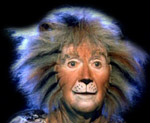 Old Gus |
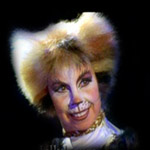 Jellylorum |
Gus ends by reflecting that "these modern productions are all very well..." but that there's really nothing to equal his "moment of mystery". It's true, on so many levels, for everything... So, Gus seems to be in the finallists, so to speak, for Deuteronomy's choice. Nevertheless, there are other Jellicles to get through, and the next is Skimbleshanks, the Railway Cat. He's a most useful cat, helping out the train staff to make sure the passengers don't wander too far out of their classed seats, and checking up on the staff themselves. Skimbleshanks is popular, although not as popular as the ever-pursued Tugger, and is one of the elder Toms. He's also quite 'well-dressed', like Bustopher, with his waistcoat and pocket watch. The Cat Train during his song has to be seen to be believed, and I haven't ruined it by getting a screen-cap.
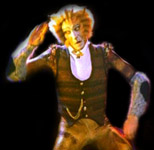
Skimbleshanks
Skimbleshanks is followed by chaos, as Deuteronomy is mysteriously vanished away by Macavity. This Mystery Cat is not held in high esteem, and, once he's spirited away Deuteronomy, he disappears. Bombalurina and Demeter, two Queens, are apparent friends of Macavity (the former seems to be the Tugger's lady of choice on several occasions) and they tell the other Jellicles about him. The two seem to be battling for Macavity's favour, or, at least, caught in an argument over who is the most right about his various attributes.
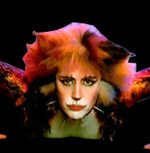 Bombalurina |
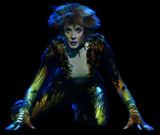 Demeter |
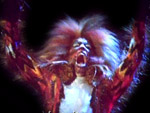
Macavity himself, on one of his rare appearances,
taunting the rest of the Jellicles
Macavity appears again, disguised as Deuteronomy, to taunt them; nearly all of the Jellicles can tell there's something wrong, however, and he's instantly caught out. As compensation, he tries to kidnap Demeter as well, until his game is stopped by Munkustrap. The two fight; Munkustrap is injured, but then the rest of the Jellicles, kittens, Toms and Queens alike, turn on Macavity until he is forced to concede defeat and leave them be. However, Deuteronomy has yet to appear. As Tantomile says, "We have to find Old Deuteronomy." Macavity, before leaving, has cast the Jellicles into darkness by short circuiting their various light sources; through the blackness, a torch beam shines out, held by one of the kittens. It eventually comes to rest on the Tugger, who suggests that "you ought to ask Magical Mister Mistoffelles, the original conjuring cat. Mistoffelles is a black cat with mystical abilities, who once, apparently, "produced seven kittens right out of a hat." The Tugger introduces him before he even appears. Mistoffelles, despite his long title, is one of the younger cats, barely more than a kitten, but gifted nonetheless, and he is very shy. He is helped by his 'beautiful assistant', Cassandra, a Siamese, and manages to produce Deuteronomy out of thin air, to everybody's surprise.
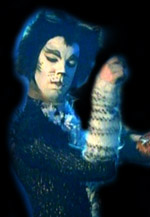
Magical Mister Mistoffelles
Once Deuteronomy is back, it seems as if the festivities are over, and he is about to make his choice. I'm always willing to bet at this stage that he would pick Gus as being the most worthy. However, at this point, Grizabella makes her final appearance, hoping once more to prove herself. Deuteronomy, of course, allows her to do so. Her arrival is heralded by the pure voice of Jemima, once more, who (in the video version, at least) also harmonises during Grizabella's song, Memory. She sings of times past, when she was beautiful, and how even memories will fade with the coming daylight. Despite this, however, she claims that everyone must look to the morning. By this time, it must surely be nearing dawn. She's about to leave, when one of the kittens who previously spurned her (Victoria) approaches, and makes contact. Other Jellicles follow, first the kittens, then the elder Queens and Toms, until she finally makes peace with Munkustrap and, through him, meets Deuteronomy himself. Of course, she is his choice. A star-studded and mist-covered staircase emerges from the sky, leading "up, up, up, past the Jellicle Moon" to the Heaviside Layer.
With Grizabella finally at peace, and the Ball over for another year, the Jellicles assemble at Deuteronomy's feet. He speaks to them (and us) as a group, with The Ad-dressing of Cats [sic; Eliot's spelling.] The song is self-explanatory through its lyrics, and its messages are plain: "A cat is not a dog" (despite what activities during The Pekes and the Pollicles may lead you to believe...), "A dog's a dog; a cat's a cat" and a cat is entitled to expect "evidences of respect", such as tidbits, and courtesy. If these things are remembered, then you may "call him by his name", the highest honour a cat can bestow.
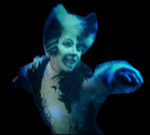 Alonso |
 Asparagus; perhaps a younger version of Gus? |
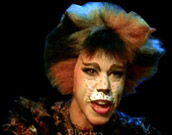 Electra, one of the kittens. |
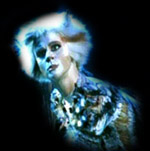 Etcetera, another of them |
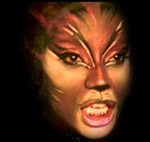 Exotica, another |
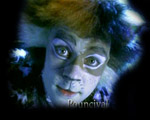 Pouncival, who, as his name suggests, is very bouncy |
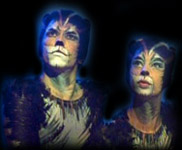 Tantomile and Coricopat, twins |
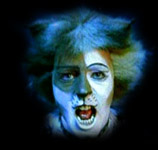 Tumblebrutus, who also has a descriptive name |

Victoria, one of the lithest of the kittens
And so, it ends. Hopefully, this has made what goes on a lot clearer, and this is what I've managed to establish from frequent listening to the OLC soundtrack and many re-viewings of the video/DVD. Mainly, this is based on my observations on the DVD, but some is taken from memories of the two productions I've seen. The plot does change according to cast, choreographer and director, obviously, dependent on how they interpret the music and lyrics. This is by no means definitive, and certainly can't put across the humour and drama as much as the show itself can. But you will, at least, have some vague clue as to why each of the acts is placed how it is, and why it's there at all.

An in-joke on the number plate of the Junkyard's abandoned car, where Jennyanydots sleeps (amongst other places) - TSE, of course, being Thomas Stearns Eliot, and there only being one poet like him.

The cast. From left to right:
front row: Electra, Rumpleteazer, Demeter, Pouncival, Jemima, Etcetera, Victoria.
second row: Jellylorum, Quaxo/Mistoffelles, The Gumbie Cat (Jennyanydots), Grizabella (in an earlier incarnation), Tantomile, Mungojerrie.
third row: Tumblebrutus, Cassandra, Bombalurina, Asparagus, Skimbleshanks, Exotica.
back row (visible): Alonso, Deuteronomy, Coricopat, The Tugger, (no idea. Any suggestions?)